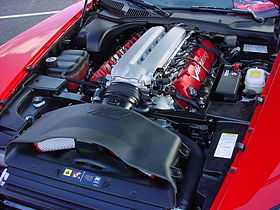Viper engine
| Viper engine | |
|---|---|
 |
|
| Overview | |
| Manufacturer | Chrysler |
| Production | 1992-present |
| Combustion chamber | |
| Configuration | 90° V10 |
| Displacement |
|
| Cylinder bore |
|
| Piston stroke |
|
| Cylinder block alloy | Aluminum |
| Cylinder head alloy | Aluminum |
| Valvetrain | Overhead valve |
| Compression ratio |
|
| Combustion | |
| Fuel system | Multi-port fuel injection |
| Fuel type | Gasoline |
| Oil system | Wet sump |
| Cooling system | Water cooled |
| Dimensions | |
| Dry weight |
|
The Viper engine is a high-performance 90° V10 engine built by Chrysler for use in the vehicle of the same name.
Production of the V10 engine started at Mound Road Engine before moving to Conner Avenue Assembly, where the Viper itself is built, in May 2001. In addition, the Viper V10 was installed in the Dodge Ram SRT-10, earning the truck the Guinness World Record for fastest production truck (later bettered by an Australian production car; the Holden HSV Maloo that uses the LS2 Corvette engine). The Dodge Tomahawk concept vehicle also uses this engine. Bitter Cars of Germany produced the Bitter GT1 based on the Lotus Elise GT1 using this engine.
The V10 was also sold to British luxury car manufacturer Bristol Cars: the Bristol Fighter was powered by a modified version of the engine which produced 525 hp (391 kW), increasing to 550 hp (410 kW) at high speed due to the ram air effect. In the more powerful Fighter S the engine was tuned to give 628 hp (660 hp at high speed). Bristol had also planned to produce the Fighter T, the V10 would have been further modified and turbocharged to produce 1,012 hp (755 kW) bhp at 5600 rpm, slightly more than the advertised 1,001 hp of the Bugatti Veyron, however Bristol have since stated that no Fighter T models were produced.
The Viper V10 is based on the Chrysler LA engine family, and appeared with the Dodge Viper in 1992. It was conceived and prototyped as a Magnum 5.9 with two extra cylinders and a longer stroke of 3.88 in (99 mm).
...
Wikipedia
